Unit 6 Do you like bananas全单元课件 (共94张PPT)
文档属性
| 名称 | Unit 6 Do you like bananas全单元课件 (共94张PPT) | 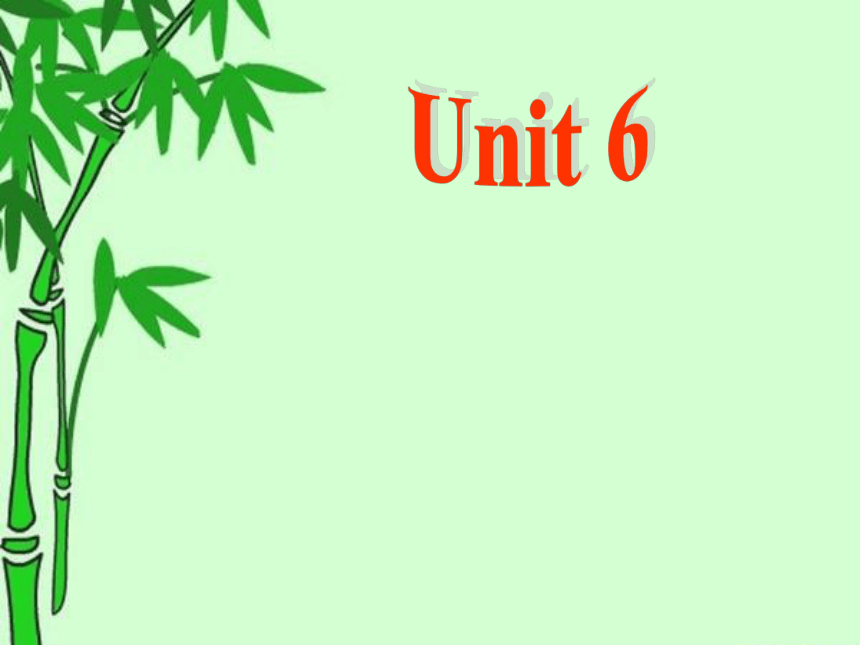 | |
| 格式 | zip | ||
| 文件大小 | 7.2MB | ||
| 资源类型 | 教案 | ||
| 版本资源 | 人教新目标(Go for it)版 | ||
| 科目 | 英语 | ||
| 更新时间 | 2022-07-29 13:10:01 | ||
图片预览

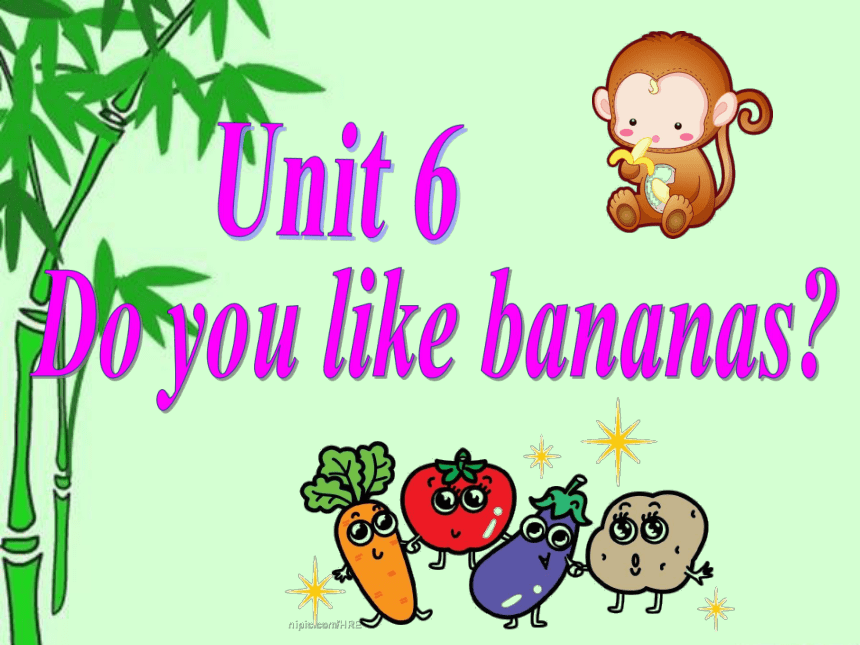
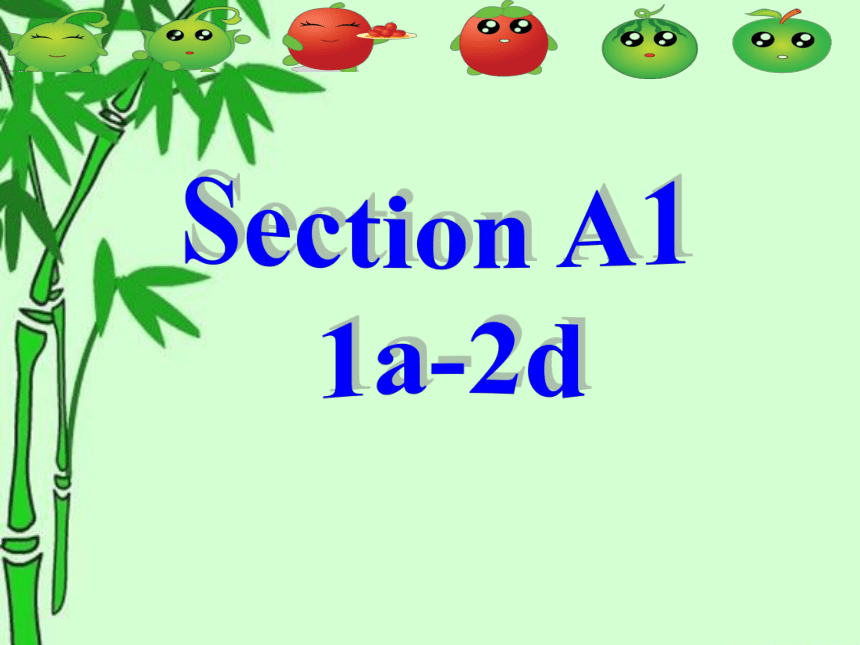
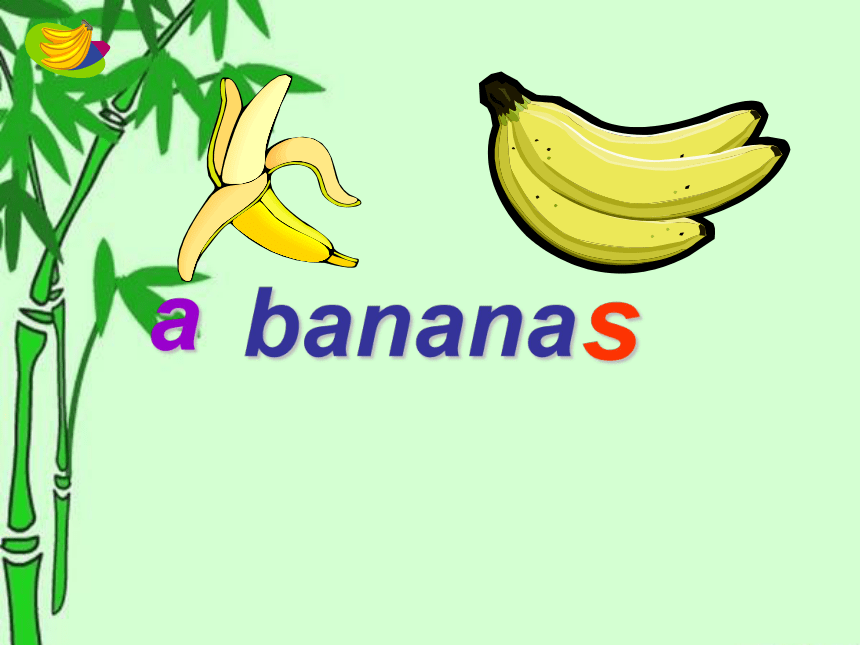
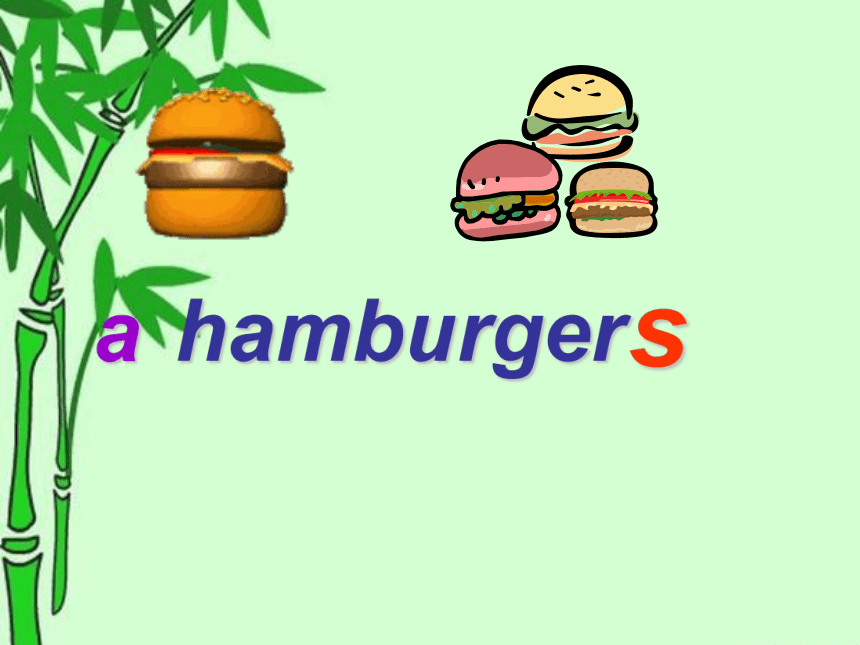
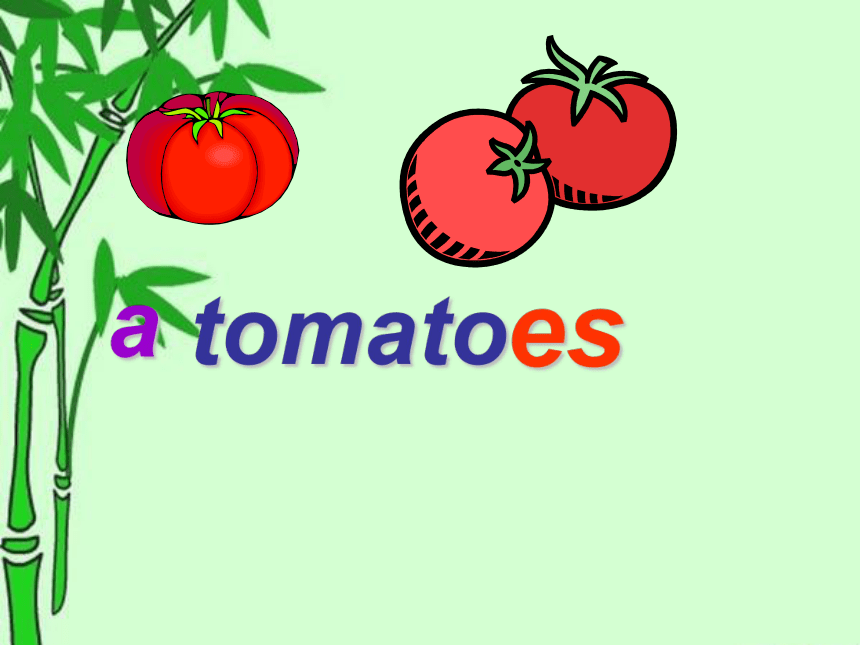
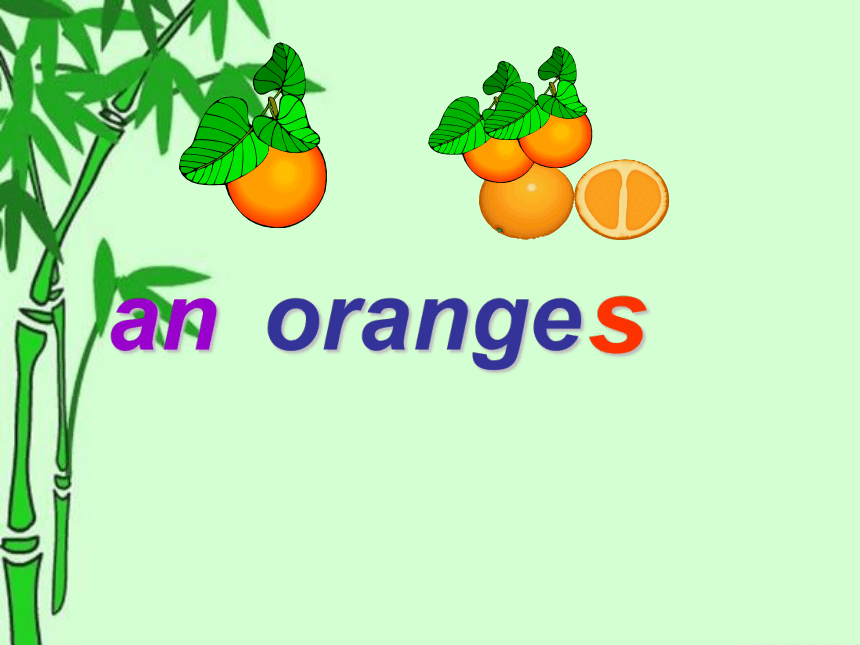
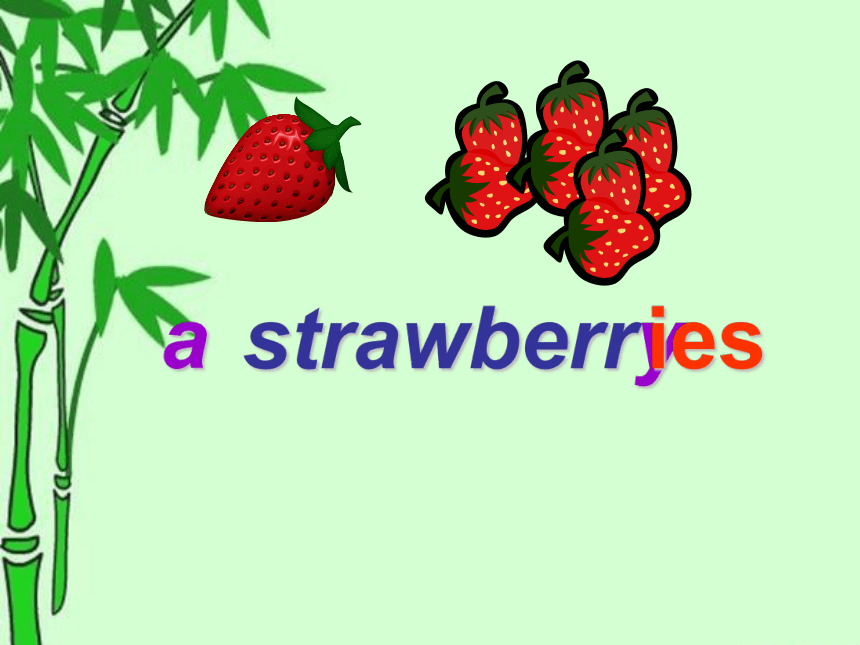
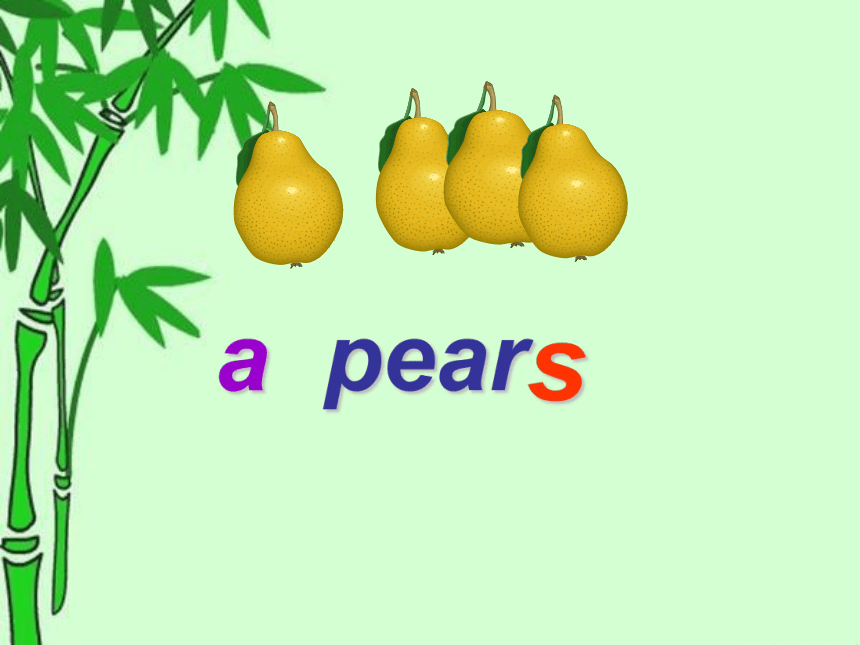

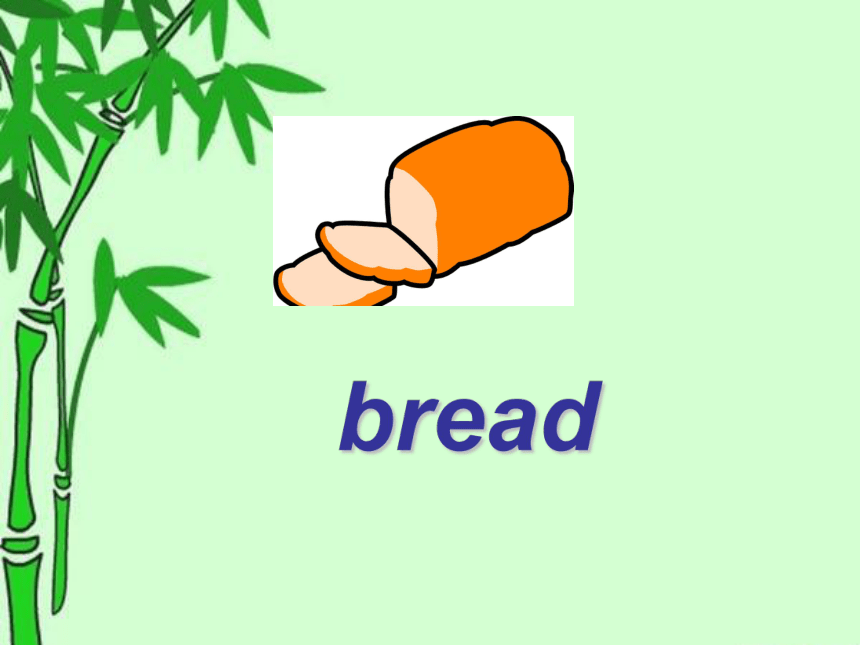
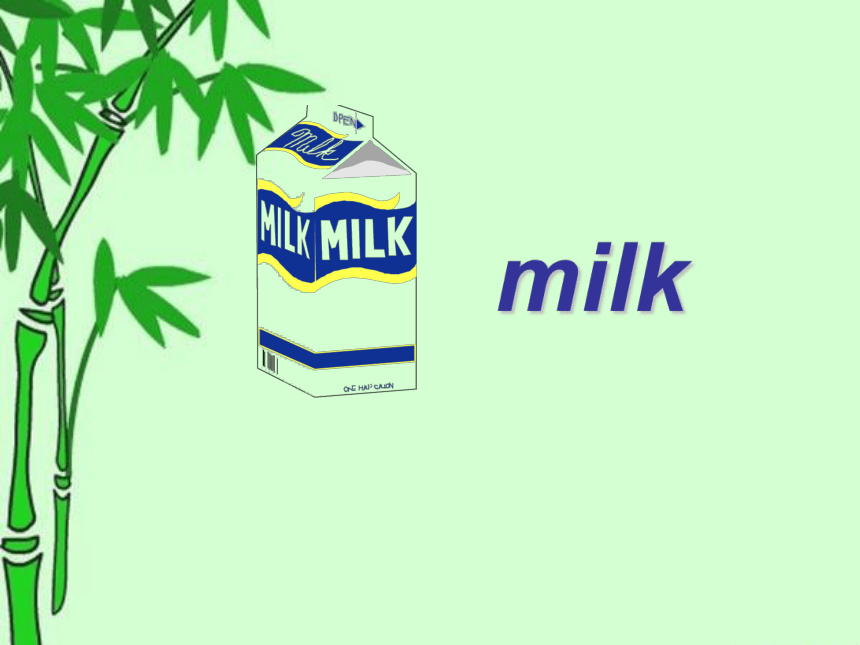
文档简介
(共94张PPT)
Unit 6
Unit 6
Do you like bananas
Section A1
1a-2d
banana
s
a
hamburger
s
a
tomato
es
a
an
orange
s
a
strawberr
y
ies
a
pear
s
ice-cream
bread
milk
salad
— What are those
— They are _____ ____.
bananas
oranges
tomatoes
strawberries
hamburgers
pears
bananas
oranges
tomatoes
strawberries
hamburgers
pears
— What’s that
— It’s __ ___.
salad
bread
ice-cream
milk
milk
bread
salad
ice-cream
hamburgers
tomatoes
oranges
ice-cream
salad
bananas
strawberries
pears
milk
bread
d
i
f
h
b
g
c
j
e
a
1a
Match the words with the things in the picture.
I like hamburgers.
Do you like hamburgers
Yes, I do.
I like bananas.
Do you like bananas
No, I don't.
I like strawberries.
Do you like strawberries
Yes, I do.
I like oranges.
Do you like oranges
No, I don't.
I like tomatoes.
Do you like tomatoes
Yes, I do.
I like pears.
Do you like pears
No, I don't.
I like ice-cream.
Do you like ice-cream
Yes, I do.
I like milk.
Do you like milk
No, I don't.
I like bread.
Do you like bread
Yes, I do.
Listen and number the conversations [1-3].
1b
A: Do you like salad
B: No, I don’t.
A: Do you like bananas
B: Yes, I do.
A: Do you like oranges
B: Yes, I do.
2
3
1
Listening
I like...
Do you like …
Yes, I do. /
No, I don’t.
Practice
Listen and circle the food you hear.
2a
hamburgers pears tomatoes strawberries
oranges ice-cream salad bananas
Listening
2b Listen again. Fill in the blanks.
tomatoes
tomatoes
ice cream
ice cream
3. Let’s have … 是一个祈使句,表示“让我们吃/喝……吧。”
Let’s have some ice-cream.
让我们吃些冰激凌吧。
have v. 吃,喝。
第三人称单数形式为has。
例句:
I have an apple every day.
我每天吃一个苹果。
[归纳] have是多义词,归纳如下:
(1) 有,拥有;如:
I have a new watch.
我有块新手表。
(2) 吃,喝;如:
Let’s have some milk and some bread.
让我们喝些牛奶,吃些面包。
(3) 构成固定短语:
have a good day
Bob doesn't like strawberries.
Does Tom like stawberries
Yes, he does.
He likes strawberries.
Tom
Bob
Bob likes ice-cream.
Does Tom like ice-cream
Bob doesn't like hambuegers.
Does Tom like hambuegers
Bob likes bananas.
Does Tom like bananas
No, he doesn't.
He doesn't like
bananas.
Yes, he does.
He likes hamburgers.
No, he doesn't.
He doesn't like
ice-cream.
--Does she like…
--Yes, she does. She likes ….
--No, she doesn’t. She doesn’t like ….
--Does he like…
--Yes, he does. He likes ….
--No, he doesn’t. He doesn’t like ….
Does John like hamburgers
What doesn't Jack like
What fruit does John like
Read the dialogue in 2d. Then answers the questions.
Reading
Yes, he does.
Jack doesn’t like salad.
John likes strawberries and apples.
Jack: Hey, John’s birthday dinner is next
week. Let’s think about the food.
Tom: Sure. How about burgers,
vegetable salad, and some fruit
Bill: Sounds good. John likes hamburgers.
Jack: Oh, I don’t like salad.
Bill: But John likes salad, and it’s his birthday.
Jack: Yes, you’re right. What about the fruit
Tom: I think John likes strawberries and apples.
Bill: OK. Let’s have strawberries and apples then.
2. How about … 相当于 What about … 意 为 “……怎么样?”是一个用来征询别人的 意 见、向别人提建议的交际用语。
How about nine o’clock 9点钟怎么样
I like strawberries. How about you
我喜欢草莓。你呢
4. sure adv. (用作副词)当然;肯定;一定
常用来回答一般疑问句,意为“当然; 的确”,相当于yes或certainly。只是 sure 在英国英语中较为常用,而在美国 英语中常用certainly。
— Are you going with us
你和我们一起去吗?
— Sure. 当然啦。
7. think about 思考,思索
Let me think about it.
让我想一想。
二、 选词填空。
Do you like ___ (strawberry/strawberries)
2. Here are some nice ___ (tomatos/tomatoes).
3. Let’s ___ (have / has) apples and bananas.
4. John likes ___ (milk/milks) and bread.
5. Sam ____ (don’t /doesn’t) like vegetable salad.
6. — Let’s play volleyball.
— _____ (Sounds/ sound) good.
√
√
√
√
√
√
你喜欢沙拉吗?
____ you ____ salad
2. 是的。____, I ____.
不,不喜欢。_____, I ______.
3. 他们喜欢梨吗?
____ _____ like pears
4. 是的。____, they ____.
不喜欢。___, they ______.
Do like
Do they
Yes do
No don’t
一、重点句型
No don’t
Yes do
5. 她喜欢西红柿吗?
_____ she _____ tomatoes
6. 是的。____, she _____.
不喜欢。___, she _______.
7. 我喜欢桔子。我不喜欢香蕉。
I ____ _______. I _____ ____ bananas.
8. 我们喜欢米饭。我们不喜欢汉堡。
We ____ ____. We _____ ___ hamburgers.
Yes does
like rice
No doesn’t
don’t like
Does like
like oranges
don’t like
9. 他喜欢冰淇淋。他不喜欢蔬菜。
He _____ ice-cream.
He _______ _____ like vegetables.
likes
doesn’t like
1. I like fruit, but I (don’t / doesn’t) like vegetables.
2. She (like / likes) bread, but she (doesn’t / don’t) like salad.
3. He (like / likes) bananas, but he (don’t / doesn’t) like oranges.
3a
Underline the correct words in the brackets.
第三人称单数形式
4. We (likes / like) hamburgers, but we (don’t / doesn’t) like chicken.
5. They (likes / like) pears, but they (don’t / doesn’t) like strawberries.
第三人称复数形式
Countable nouns Uncount-able nouns Countable and uncountable nouns
hamburgers, ___ ___________________________________________________________________________
apples
bananas
pears
carrots
tomatoes
vegetables
strawberries
eggs
oranges
milk
bread
rice
food
fruit
ice-cream
salad
chicken
可数名词和不可数名词
可数名词
(1)
(2)
(3)
(4)
定义:是可以计数的名词。
可数名词前可以用 a , an 限定,表一个….。
可数名词前可以用 one, two , three… 限定。
可数名词有复数形式。
可数名词和不可数名词
不可数名词
(1)
(2)
(3)
(4)
定义:是指不能计数的名词。
不可数名词前不可以用 a , an 限定。
不可数名词前不可以用 one, two , three… 限定。
不可数名词没有复数形式。
注意: some既可以修饰可数名词的复数形式,也可以修饰 不可数名词.
特别提醒:
不可数名词作主语时,谓语动词用单数。
可数名词和不可数名词
既可数又不可数名词
定义:在某些情况下能计数,在某些情况下
不能计数的名词。
e.g. (1) a chicken 一只鸡 a dog 一只狗
chicken 鸡肉 dog 狗肉
(2) an ice cream 一个冰淇淋
ice cream 泛指“冰淇淋”
(3) a salad 一碟沙拉
salad 泛指“沙拉”
So, let’s get salad.
Yes, I do.
Do you like salad
OK.
1
3b
Number these sentences [1-4] to make a conversation.
3
2
4
A: Do you like salad
B: Yes, I do.
C: So, let’s get salad.
D: OK.
so是连词,意思是“那么”,表示引出下文。
A: Do you like …
B: Yes, I do. / No, I don’t.
Food likes doesn’t like
ice-cream Liu Li Zhang Jun
rice
oranges
milk
salad
strawberries
tomatoes
bananas
chicken
rice
carrots
eggs
food
1. orange 2. salad 3. eggs 4. apple
5. ice-cream 6. hamburger 7. banana
8. chicken 9. rice 10. carrots
3
4
7
1a
Write the number of each word next to the correct food.
10
6
1
8
2
5
9
fruit: pears, ___________________________
_________________________________
vegetables: ____________________________
strawberries
apples
bananas
1b
How many other words can you add to the lists
oranges
carrot
tomatoes
potatoes
Listen and circle the food you hear in 1a.
1c
1. orange 2. salad 3. eggs 4. apple
5. ice-cream 6. hamburger 7. banana
8. chicken 9. rice 10. carrots
Listen again. Fill in the chart.
Likes Doesn’t like
Tom carrots
Sally
salad
apples
salad
bananas
oranges
vegetables
ice-cream
apples
Likes Doesn’t like
Tom carrots
Sally
salad
apples
salad
bananas
oranges
vegetables
ice-cream
Does Tom like...
Yes, he does. He likes...
/No, he doesn’t. He doesn't like...
Does Sally like...
Yes, she does. She likes...
/No, she doesn’t. She doesn't like...
Pairwork
Do you like ...
Yes, I do. I like...
No,I don’t. I don’t like ...
-What do you like for breakfast/lunch /dinner
I like… and …for lunch.
-I like… and …for breakfast.
I like … and …for dinner.
2a
Food Yes Maybe No
fruit
vegetables
eggs
chicken
hamburgers
ice-cream
Which food do you think is healthy Check (√) Yes, Maybe or No.
√
√
√
√
√
√
Read the magazine article and circle the food words.
2b
Sports Star Eats Well!
David asks about the volleyball star, Cindy Smith, about her eating habits.
David: Hello, Cindy. What do you like for breakfast
Cindy: I love fruit. I think it’s healthy.
David: OK. So what fruit do you like Do you like bananas
Cindy: Well, I don’t like bananas. But I like oranges and apples.
David: What about lunch Do you like salad
Cindy: Yes, I really like it.
David: Hmm … and do you like hamburgers for dinner
Cindy: Oh, no, they’re not healthy. I like chicken for dinner.
David: OK. well, one last question — do you eat ice-cream after dinner
Cindy: Err … I like ice-cream … but I don’t eat it. I don’t want to be fat.
fruit bananas oranges apples salad hamburgers chicken ice-cream
Likes Doesn’t like
Cindy likes healthy food.
1. Cindy _______________________________
2. She _________________________________
3. She _________________________________
4. Cindy doesn’t ________________________
5. She doesn’t __________________________
2c
Write five sentences about Cindy’s eating habits.
Cindy likes healthy food.
1. Cindy _______________________________
2. She _________________________________
3. She _________________________________
4. Cindy doesn’t ________________________
5. She doesn’t __________________________
Let’s check the questions.
loves fruit.
eat ice-cream after dinner.
likes oranges and bananas.
likes salad for lunch.
like hamburgers for dinner.
Sports star
David the volleyball star, Cindy Smith, about her eating habits.
David: Hello,Cindy. What do you like for breakfast
Cindy: I love fruit.I think it’s healthy
David: OK,So what fruit do you like Do you like bananas
Cindy: Well, I don’t like bananas. But I like oranges and
apples
David: What about lunch Do you like salad
Cindy: Yes, I really like it.
David: Hmm…and do you like hamburgers for dinner
Cindy: Oh, no, They’re not healthy. I Iike chicken for dinner.
David: OK,well, one last question------do you eat ice-cream
after dinner
Cindy: Err… I like ice-cream.... But I don’t eat it. I don’t want
to be fat.
eats well
asks
1. Sports star eats well! 体育明星吃得好!
句中的well用作副词,意为 “好”,用来修饰动词eat,意为“吃得好”。
例如:
Peter eats very well at school.
彼得在学校里吃得很好。
Explanation
Tom likes basketball. He plays it very well.
汤姆喜欢篮球。他打得很好。
(1) good 是形容词,常置于名词之前,表示“好的”。
e.g. Mr. Wang is a good teacher.
王老师是一位好老师。
(2) well用作副词,常置于动词之后,表示程度“好;满意地”
The boy can swim very well.
这个男孩游泳游得很好。
well 与 good
David asks the volleyball star, Cindy Smith, about her eating habits.
ask (sb.) about sth (向某人)询问某事
I always ask Tom about his health。
我总是询问Tom的健康状况。
Tom asks me about Lily.
Tom向我打听lily。
She asks about
Can I ask about the game
我能问问比赛请况吗?
ask (sb.) for sth.
She asks for help. 她寻求帮助。
She asks me for help.她请我帮忙。
4. I like chicken for dinner.
晚饭我喜欢鸡肉。
“like + 食品名词 + for + 某餐”表示某人喜欢吃什么
for 作介词,表示“对于……,就……而言”。
for breakfast / lunch / dinner
就早餐/午餐/晚餐而言
What do you like for dinner
晚饭你喜欢吃什么?
I like vegetables and rice for dinner.
午饭我喜欢蔬菜和米饭。
She likes bread and milk for breakfast.
早餐他喜欢牛奶和面包。
6. I don’t want to be fat. 我不想变胖。
want 动词,意为“要;想要”
want sth.
想要某物
want to be+adj.
想变成...
want to do sth.
想要做某事
want sb. to do sth.
想要某人做某事
I want some rice.
我想要些米饭。
I want to be interesting.
我想变得有趣。
She wants to ask a question.
她想问个问题。
Jack wants me to go to school with him.
杰克想让我和他一起去上学。
3a
Complete the survey for you and your partner.
Fill in the chart.
Breakfast Lunch Dinner
I like
I don’t like
My partner likes
My partner doesn’t like
apples and
hamburgers
chicken and rice
milk
tomatoes
vegetables and bread
eggs
What do you like for breakfast
I like ... for breakfast.
Do you like … for lunch
Do you like … for dinner
Yes, I do./
No, I don’t. I like ...for lunch/dinner.
Fill in the chart.
Breakfast Lunch Dinner
I like
I don’t like
My partner likes
My partner doesn’t like
apples and
hamburgers
chicken and rice
milk
tomatoes
vegetables and bread
eggs
eggs and milk
hamburgers and salad
bananas and bread
oranges
chicken
strawberries
Write about what you and your partner like and don’t like for breakfast, lunch and dinner.
3b
For breakfast, I like ________, but I don’t like ______. For lunch, _______________________
And for dinner, __________________________ For breakfast, ______ likes ________________ For lunch, ______________________________ And for dinner, __________________________
这是一篇介绍某人一日三餐的短文,写作过
程中应用如下句型:
For breakfast, I like …, but I don’t like … 早餐,我喜欢……,但我不喜欢……
2. I like … for breakfast/lunch/dinner.
早饭/午饭/晚饭我喜欢……
3. I don't like … for breakfast/lunch/dinner. 早饭/午饭/晚饭我不喜欢……
4. He/She likes …, but he/she doesn’t like ….
他/她喜欢……,但他/她不喜欢……
5. For breakfast/ lunch /dinner, he/she likes/ eats ….
就早饭/午饭/晚饭而言,他/她喜欢/吃……
6. He/She doesn’t like … for breakfast/ lunch/ dinner.
早饭/午饭/晚饭他/她不喜欢……
For breakfast, I like _____________________, but I don’t like _____. For lunch, _________
______________________________________
__________________. And for dinner, _____
__________________________________. For breakfast, ______ likes __________________
_____________________. For lunch, _______
_____________________________________
apples and hamburgers
milk
I like
I like
chicken and I like vegetables and bread, but
I don’t like tomatoes
Mike
eggs and milk, but
he likes
chicken and rice, but I don’t like apples
he doesn’t like oranges
hamburgers and salad, but he doesn’t like
________. And for dinner, _______________
______________________________________
chicken
he likes bananas
and bread, but he doesn’t like strawberries.
hamburger tomato carrot
photo banana strawberry
hat table dictionary
egg apple pear
radio vegetable family
pencil key volleyball
Do you know the plurals of these words Put them in the correct columns.
1
+s +es y→i+es
hamburgers
tomatoes
carrots
photos
bananas
strawberries
hats
tables
dictionaries
eggs
apples
pears
radios
vegetables
families
pencils
keys
volleyballs
What food, sports and colors do you like and dislike
2
Food:
I like ______________________.
I don’t like _________________.
chicken, carrots
tomatoes
Sports:
I like _______________________.
I don’t like __________________.
I like ______________________.
I don’t like _________________.
colors:
ping-pong and soccer
basketball
red and green
black
What food, sports and colors do your parents like and dislike Write at least five sentences.
3
这是写他人的个人爱好的句子。应注意人称和数的变化。当谈及父亲或母亲单个人称时,应用第三人称单数形式,常用句型:
1. My father/mother likes …
我爸爸/妈妈喜欢……
2. My father/mother doesn’t like …
我爸爸/妈妈不喜欢……
3. 也可以合在一句话中写,
He/She likes …, but he/she doesn’t like ….
他/她喜欢……,但他/她不喜欢……。
4. 另外,如果是两人同时喜欢或不喜欢什么用:
They like … 或 They don’t like …
他们(不)喜欢 ……
Food:
My father likes _____, but he doesn’t like _______.
My mother likes ______, but she doesn’t like ____.
eggs
apples
carrots
rice
Sports:
My father likes ____________________.
My mother likes _________.
They don’t like __________.
My father likes ____, but he doesn’t like ___.
My mother likes _____, but she doesn’t like _______.
colors:
basketball and soccer
tennis
blue red
black
ping-pong
yellow
主系表结构
句式 结构 例句
肯定句 主语+am/is/are +其他 We are friends.
否定句 主语+am/is/are +not+其他 We are not friends.
一般疑问句 Am/Is/Are+主语+其他? Are you friends
肯定回答 Yes,主语+am/is/are. Yes, we are.
否定回答 No,主语+am/is/are not. No, we aren't.
句式 结构 例句
肯定句 主语+动词原形+其他 We like China.
否定句 主语+don't+动词原形+其他 We don't like China.
一般疑问句 Do+主语+动词原形+其他? Do you like China
肯定回答 Yes,主语+do. Yes, we do.
否定回答 No,主语+don't No, we don't.
主谓宾结构
句式 结构 例句
肯定句 主语+动词s+其他 She likes China.
否定句 主语+doesn't+动词原形+其他 He doesn't like China.
一般疑问句 Does+主语+动词原形+其他? Does he like China
肯定回答 Yes,主语+does. Yes, he does.
否定回答 No,主语+doesn't No, he doesn't.
主语是第三人称单数
Unit 6
Unit 6
Do you like bananas
Section A1
1a-2d
banana
s
a
hamburger
s
a
tomato
es
a
an
orange
s
a
strawberr
y
ies
a
pear
s
ice-cream
bread
milk
salad
— What are those
— They are _____ ____.
bananas
oranges
tomatoes
strawberries
hamburgers
pears
bananas
oranges
tomatoes
strawberries
hamburgers
pears
— What’s that
— It’s __ ___.
salad
bread
ice-cream
milk
milk
bread
salad
ice-cream
hamburgers
tomatoes
oranges
ice-cream
salad
bananas
strawberries
pears
milk
bread
d
i
f
h
b
g
c
j
e
a
1a
Match the words with the things in the picture.
I like hamburgers.
Do you like hamburgers
Yes, I do.
I like bananas.
Do you like bananas
No, I don't.
I like strawberries.
Do you like strawberries
Yes, I do.
I like oranges.
Do you like oranges
No, I don't.
I like tomatoes.
Do you like tomatoes
Yes, I do.
I like pears.
Do you like pears
No, I don't.
I like ice-cream.
Do you like ice-cream
Yes, I do.
I like milk.
Do you like milk
No, I don't.
I like bread.
Do you like bread
Yes, I do.
Listen and number the conversations [1-3].
1b
A: Do you like salad
B: No, I don’t.
A: Do you like bananas
B: Yes, I do.
A: Do you like oranges
B: Yes, I do.
2
3
1
Listening
I like...
Do you like …
Yes, I do. /
No, I don’t.
Practice
Listen and circle the food you hear.
2a
hamburgers pears tomatoes strawberries
oranges ice-cream salad bananas
Listening
2b Listen again. Fill in the blanks.
tomatoes
tomatoes
ice cream
ice cream
3. Let’s have … 是一个祈使句,表示“让我们吃/喝……吧。”
Let’s have some ice-cream.
让我们吃些冰激凌吧。
have v. 吃,喝。
第三人称单数形式为has。
例句:
I have an apple every day.
我每天吃一个苹果。
[归纳] have是多义词,归纳如下:
(1) 有,拥有;如:
I have a new watch.
我有块新手表。
(2) 吃,喝;如:
Let’s have some milk and some bread.
让我们喝些牛奶,吃些面包。
(3) 构成固定短语:
have a good day
Bob doesn't like strawberries.
Does Tom like stawberries
Yes, he does.
He likes strawberries.
Tom
Bob
Bob likes ice-cream.
Does Tom like ice-cream
Bob doesn't like hambuegers.
Does Tom like hambuegers
Bob likes bananas.
Does Tom like bananas
No, he doesn't.
He doesn't like
bananas.
Yes, he does.
He likes hamburgers.
No, he doesn't.
He doesn't like
ice-cream.
--Does she like…
--Yes, she does. She likes ….
--No, she doesn’t. She doesn’t like ….
--Does he like…
--Yes, he does. He likes ….
--No, he doesn’t. He doesn’t like ….
Does John like hamburgers
What doesn't Jack like
What fruit does John like
Read the dialogue in 2d. Then answers the questions.
Reading
Yes, he does.
Jack doesn’t like salad.
John likes strawberries and apples.
Jack: Hey, John’s birthday dinner is next
week. Let’s think about the food.
Tom: Sure. How about burgers,
vegetable salad, and some fruit
Bill: Sounds good. John likes hamburgers.
Jack: Oh, I don’t like salad.
Bill: But John likes salad, and it’s his birthday.
Jack: Yes, you’re right. What about the fruit
Tom: I think John likes strawberries and apples.
Bill: OK. Let’s have strawberries and apples then.
2. How about … 相当于 What about … 意 为 “……怎么样?”是一个用来征询别人的 意 见、向别人提建议的交际用语。
How about nine o’clock 9点钟怎么样
I like strawberries. How about you
我喜欢草莓。你呢
4. sure adv. (用作副词)当然;肯定;一定
常用来回答一般疑问句,意为“当然; 的确”,相当于yes或certainly。只是 sure 在英国英语中较为常用,而在美国 英语中常用certainly。
— Are you going with us
你和我们一起去吗?
— Sure. 当然啦。
7. think about 思考,思索
Let me think about it.
让我想一想。
二、 选词填空。
Do you like ___ (strawberry/strawberries)
2. Here are some nice ___ (tomatos/tomatoes).
3. Let’s ___ (have / has) apples and bananas.
4. John likes ___ (milk/milks) and bread.
5. Sam ____ (don’t /doesn’t) like vegetable salad.
6. — Let’s play volleyball.
— _____ (Sounds/ sound) good.
√
√
√
√
√
√
你喜欢沙拉吗?
____ you ____ salad
2. 是的。____, I ____.
不,不喜欢。_____, I ______.
3. 他们喜欢梨吗?
____ _____ like pears
4. 是的。____, they ____.
不喜欢。___, they ______.
Do like
Do they
Yes do
No don’t
一、重点句型
No don’t
Yes do
5. 她喜欢西红柿吗?
_____ she _____ tomatoes
6. 是的。____, she _____.
不喜欢。___, she _______.
7. 我喜欢桔子。我不喜欢香蕉。
I ____ _______. I _____ ____ bananas.
8. 我们喜欢米饭。我们不喜欢汉堡。
We ____ ____. We _____ ___ hamburgers.
Yes does
like rice
No doesn’t
don’t like
Does like
like oranges
don’t like
9. 他喜欢冰淇淋。他不喜欢蔬菜。
He _____ ice-cream.
He _______ _____ like vegetables.
likes
doesn’t like
1. I like fruit, but I (don’t / doesn’t) like vegetables.
2. She (like / likes) bread, but she (doesn’t / don’t) like salad.
3. He (like / likes) bananas, but he (don’t / doesn’t) like oranges.
3a
Underline the correct words in the brackets.
第三人称单数形式
4. We (likes / like) hamburgers, but we (don’t / doesn’t) like chicken.
5. They (likes / like) pears, but they (don’t / doesn’t) like strawberries.
第三人称复数形式
Countable nouns Uncount-able nouns Countable and uncountable nouns
hamburgers, ___ ___________________________________________________________________________
apples
bananas
pears
carrots
tomatoes
vegetables
strawberries
eggs
oranges
milk
bread
rice
food
fruit
ice-cream
salad
chicken
可数名词和不可数名词
可数名词
(1)
(2)
(3)
(4)
定义:是可以计数的名词。
可数名词前可以用 a , an 限定,表一个….。
可数名词前可以用 one, two , three… 限定。
可数名词有复数形式。
可数名词和不可数名词
不可数名词
(1)
(2)
(3)
(4)
定义:是指不能计数的名词。
不可数名词前不可以用 a , an 限定。
不可数名词前不可以用 one, two , three… 限定。
不可数名词没有复数形式。
注意: some既可以修饰可数名词的复数形式,也可以修饰 不可数名词.
特别提醒:
不可数名词作主语时,谓语动词用单数。
可数名词和不可数名词
既可数又不可数名词
定义:在某些情况下能计数,在某些情况下
不能计数的名词。
e.g. (1) a chicken 一只鸡 a dog 一只狗
chicken 鸡肉 dog 狗肉
(2) an ice cream 一个冰淇淋
ice cream 泛指“冰淇淋”
(3) a salad 一碟沙拉
salad 泛指“沙拉”
So, let’s get salad.
Yes, I do.
Do you like salad
OK.
1
3b
Number these sentences [1-4] to make a conversation.
3
2
4
A: Do you like salad
B: Yes, I do.
C: So, let’s get salad.
D: OK.
so是连词,意思是“那么”,表示引出下文。
A: Do you like …
B: Yes, I do. / No, I don’t.
Food likes doesn’t like
ice-cream Liu Li Zhang Jun
rice
oranges
milk
salad
strawberries
tomatoes
bananas
chicken
rice
carrots
eggs
food
1. orange 2. salad 3. eggs 4. apple
5. ice-cream 6. hamburger 7. banana
8. chicken 9. rice 10. carrots
3
4
7
1a
Write the number of each word next to the correct food.
10
6
1
8
2
5
9
fruit: pears, ___________________________
_________________________________
vegetables: ____________________________
strawberries
apples
bananas
1b
How many other words can you add to the lists
oranges
carrot
tomatoes
potatoes
Listen and circle the food you hear in 1a.
1c
1. orange 2. salad 3. eggs 4. apple
5. ice-cream 6. hamburger 7. banana
8. chicken 9. rice 10. carrots
Listen again. Fill in the chart.
Likes Doesn’t like
Tom carrots
Sally
salad
apples
salad
bananas
oranges
vegetables
ice-cream
apples
Likes Doesn’t like
Tom carrots
Sally
salad
apples
salad
bananas
oranges
vegetables
ice-cream
Does Tom like...
Yes, he does. He likes...
/No, he doesn’t. He doesn't like...
Does Sally like...
Yes, she does. She likes...
/No, she doesn’t. She doesn't like...
Pairwork
Do you like ...
Yes, I do. I like...
No,I don’t. I don’t like ...
-What do you like for breakfast/lunch /dinner
I like… and …for lunch.
-I like… and …for breakfast.
I like … and …for dinner.
2a
Food Yes Maybe No
fruit
vegetables
eggs
chicken
hamburgers
ice-cream
Which food do you think is healthy Check (√) Yes, Maybe or No.
√
√
√
√
√
√
Read the magazine article and circle the food words.
2b
Sports Star Eats Well!
David asks about the volleyball star, Cindy Smith, about her eating habits.
David: Hello, Cindy. What do you like for breakfast
Cindy: I love fruit. I think it’s healthy.
David: OK. So what fruit do you like Do you like bananas
Cindy: Well, I don’t like bananas. But I like oranges and apples.
David: What about lunch Do you like salad
Cindy: Yes, I really like it.
David: Hmm … and do you like hamburgers for dinner
Cindy: Oh, no, they’re not healthy. I like chicken for dinner.
David: OK. well, one last question — do you eat ice-cream after dinner
Cindy: Err … I like ice-cream … but I don’t eat it. I don’t want to be fat.
fruit bananas oranges apples salad hamburgers chicken ice-cream
Likes Doesn’t like
Cindy likes healthy food.
1. Cindy _______________________________
2. She _________________________________
3. She _________________________________
4. Cindy doesn’t ________________________
5. She doesn’t __________________________
2c
Write five sentences about Cindy’s eating habits.
Cindy likes healthy food.
1. Cindy _______________________________
2. She _________________________________
3. She _________________________________
4. Cindy doesn’t ________________________
5. She doesn’t __________________________
Let’s check the questions.
loves fruit.
eat ice-cream after dinner.
likes oranges and bananas.
likes salad for lunch.
like hamburgers for dinner.
Sports star
David the volleyball star, Cindy Smith, about her eating habits.
David: Hello,Cindy. What do you like for breakfast
Cindy: I love fruit.I think it’s healthy
David: OK,So what fruit do you like Do you like bananas
Cindy: Well, I don’t like bananas. But I like oranges and
apples
David: What about lunch Do you like salad
Cindy: Yes, I really like it.
David: Hmm…and do you like hamburgers for dinner
Cindy: Oh, no, They’re not healthy. I Iike chicken for dinner.
David: OK,well, one last question------do you eat ice-cream
after dinner
Cindy: Err… I like ice-cream.... But I don’t eat it. I don’t want
to be fat.
eats well
asks
1. Sports star eats well! 体育明星吃得好!
句中的well用作副词,意为 “好”,用来修饰动词eat,意为“吃得好”。
例如:
Peter eats very well at school.
彼得在学校里吃得很好。
Explanation
Tom likes basketball. He plays it very well.
汤姆喜欢篮球。他打得很好。
(1) good 是形容词,常置于名词之前,表示“好的”。
e.g. Mr. Wang is a good teacher.
王老师是一位好老师。
(2) well用作副词,常置于动词之后,表示程度“好;满意地”
The boy can swim very well.
这个男孩游泳游得很好。
well 与 good
David asks the volleyball star, Cindy Smith, about her eating habits.
ask (sb.) about sth (向某人)询问某事
I always ask Tom about his health。
我总是询问Tom的健康状况。
Tom asks me about Lily.
Tom向我打听lily。
She asks about
Can I ask about the game
我能问问比赛请况吗?
ask (sb.) for sth.
She asks for help. 她寻求帮助。
She asks me for help.她请我帮忙。
4. I like chicken for dinner.
晚饭我喜欢鸡肉。
“like + 食品名词 + for + 某餐”表示某人喜欢吃什么
for 作介词,表示“对于……,就……而言”。
for breakfast / lunch / dinner
就早餐/午餐/晚餐而言
What do you like for dinner
晚饭你喜欢吃什么?
I like vegetables and rice for dinner.
午饭我喜欢蔬菜和米饭。
She likes bread and milk for breakfast.
早餐他喜欢牛奶和面包。
6. I don’t want to be fat. 我不想变胖。
want 动词,意为“要;想要”
want sth.
想要某物
want to be+adj.
想变成...
want to do sth.
想要做某事
want sb. to do sth.
想要某人做某事
I want some rice.
我想要些米饭。
I want to be interesting.
我想变得有趣。
She wants to ask a question.
她想问个问题。
Jack wants me to go to school with him.
杰克想让我和他一起去上学。
3a
Complete the survey for you and your partner.
Fill in the chart.
Breakfast Lunch Dinner
I like
I don’t like
My partner likes
My partner doesn’t like
apples and
hamburgers
chicken and rice
milk
tomatoes
vegetables and bread
eggs
What do you like for breakfast
I like ... for breakfast.
Do you like … for lunch
Do you like … for dinner
Yes, I do./
No, I don’t. I like ...for lunch/dinner.
Fill in the chart.
Breakfast Lunch Dinner
I like
I don’t like
My partner likes
My partner doesn’t like
apples and
hamburgers
chicken and rice
milk
tomatoes
vegetables and bread
eggs
eggs and milk
hamburgers and salad
bananas and bread
oranges
chicken
strawberries
Write about what you and your partner like and don’t like for breakfast, lunch and dinner.
3b
For breakfast, I like ________, but I don’t like ______. For lunch, _______________________
And for dinner, __________________________ For breakfast, ______ likes ________________ For lunch, ______________________________ And for dinner, __________________________
这是一篇介绍某人一日三餐的短文,写作过
程中应用如下句型:
For breakfast, I like …, but I don’t like … 早餐,我喜欢……,但我不喜欢……
2. I like … for breakfast/lunch/dinner.
早饭/午饭/晚饭我喜欢……
3. I don't like … for breakfast/lunch/dinner. 早饭/午饭/晚饭我不喜欢……
4. He/She likes …, but he/she doesn’t like ….
他/她喜欢……,但他/她不喜欢……
5. For breakfast/ lunch /dinner, he/she likes/ eats ….
就早饭/午饭/晚饭而言,他/她喜欢/吃……
6. He/She doesn’t like … for breakfast/ lunch/ dinner.
早饭/午饭/晚饭他/她不喜欢……
For breakfast, I like _____________________, but I don’t like _____. For lunch, _________
______________________________________
__________________. And for dinner, _____
__________________________________. For breakfast, ______ likes __________________
_____________________. For lunch, _______
_____________________________________
apples and hamburgers
milk
I like
I like
chicken and I like vegetables and bread, but
I don’t like tomatoes
Mike
eggs and milk, but
he likes
chicken and rice, but I don’t like apples
he doesn’t like oranges
hamburgers and salad, but he doesn’t like
________. And for dinner, _______________
______________________________________
chicken
he likes bananas
and bread, but he doesn’t like strawberries.
hamburger tomato carrot
photo banana strawberry
hat table dictionary
egg apple pear
radio vegetable family
pencil key volleyball
Do you know the plurals of these words Put them in the correct columns.
1
+s +es y→i+es
hamburgers
tomatoes
carrots
photos
bananas
strawberries
hats
tables
dictionaries
eggs
apples
pears
radios
vegetables
families
pencils
keys
volleyballs
What food, sports and colors do you like and dislike
2
Food:
I like ______________________.
I don’t like _________________.
chicken, carrots
tomatoes
Sports:
I like _______________________.
I don’t like __________________.
I like ______________________.
I don’t like _________________.
colors:
ping-pong and soccer
basketball
red and green
black
What food, sports and colors do your parents like and dislike Write at least five sentences.
3
这是写他人的个人爱好的句子。应注意人称和数的变化。当谈及父亲或母亲单个人称时,应用第三人称单数形式,常用句型:
1. My father/mother likes …
我爸爸/妈妈喜欢……
2. My father/mother doesn’t like …
我爸爸/妈妈不喜欢……
3. 也可以合在一句话中写,
He/She likes …, but he/she doesn’t like ….
他/她喜欢……,但他/她不喜欢……。
4. 另外,如果是两人同时喜欢或不喜欢什么用:
They like … 或 They don’t like …
他们(不)喜欢 ……
Food:
My father likes _____, but he doesn’t like _______.
My mother likes ______, but she doesn’t like ____.
eggs
apples
carrots
rice
Sports:
My father likes ____________________.
My mother likes _________.
They don’t like __________.
My father likes ____, but he doesn’t like ___.
My mother likes _____, but she doesn’t like _______.
colors:
basketball and soccer
tennis
blue red
black
ping-pong
yellow
主系表结构
句式 结构 例句
肯定句 主语+am/is/are +其他 We are friends.
否定句 主语+am/is/are +not+其他 We are not friends.
一般疑问句 Am/Is/Are+主语+其他? Are you friends
肯定回答 Yes,主语+am/is/are. Yes, we are.
否定回答 No,主语+am/is/are not. No, we aren't.
句式 结构 例句
肯定句 主语+动词原形+其他 We like China.
否定句 主语+don't+动词原形+其他 We don't like China.
一般疑问句 Do+主语+动词原形+其他? Do you like China
肯定回答 Yes,主语+do. Yes, we do.
否定回答 No,主语+don't No, we don't.
主谓宾结构
句式 结构 例句
肯定句 主语+动词s+其他 She likes China.
否定句 主语+doesn't+动词原形+其他 He doesn't like China.
一般疑问句 Does+主语+动词原形+其他? Does he like China
肯定回答 Yes,主语+does. Yes, he does.
否定回答 No,主语+doesn't No, he doesn't.
主语是第三人称单数
同课章节目录
- starters 预备篇(2012秋审查)
- Unit 1 Good morning !
- Unit 2 What’s this in English?
- Unit 3 What color is it ?
- Unit 1 My name's Gina.
- Section A
- Section B
- Unit 2 This is my sister.
- Section A
- Section B
- Unit 3 Is this your pencil?
- Section A
- Section B
- Unit 4 Where's my schoolbag?
- Section A
- Section B
- Unit 5 Do you have a soccer ball?
- Section A
- Section B
- Unit 6 Do you like bananas?
- Section A
- Section B
- Unit 7 How much are these socks?
- Section A
- Section B
- Unit 8 When is your birthday?
- Section A
- Section B
- Unit 9 My favorite subject is science.
- Section A
- Section B
